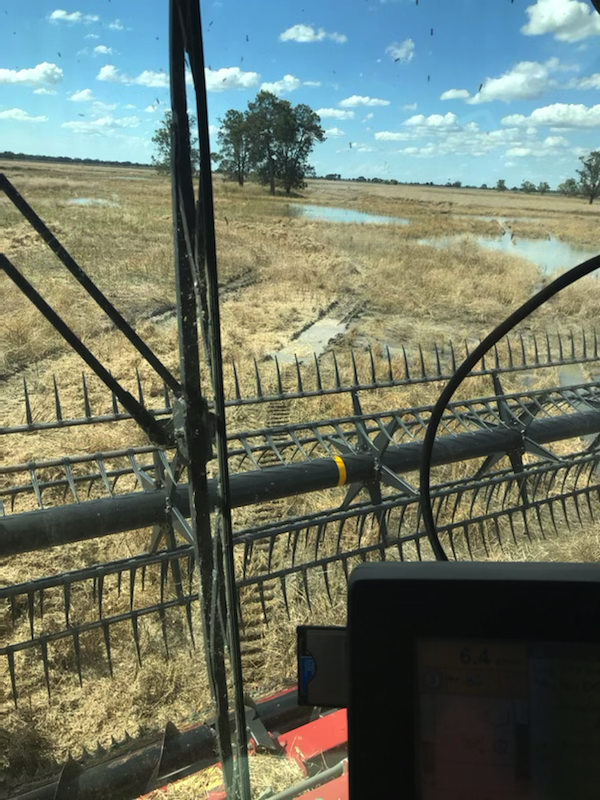What's happening with harvest?
Marnie Ryan
25 November 2022, 2:41 AM
 Aerial image showing inundated crops in Coonamble (Sparra Dewson, Wingadee)
Aerial image showing inundated crops in Coonamble (Sparra Dewson, Wingadee)Widespread flooding and wet conditions have delayed ripening and stalled harvest in many area but in some shires headers are already active - albeit with tracks fitted or with tractors on standby for removal from bogs.
Despite many thousands of hectares submerged and expected downgrades to some cereals and oilseeds, it's not all doom and gloom as croppers manoeuvre their way into a harvest presenting a whole new level of logistical challenges.
Current cropping statistics
Canola and wheat cropping has significantly increased in comparison to previous years. Director and Agronomist at Delta Ag Coonamble Graeme Callaghan said that canola crops are up by over 300% this year.
"Farmers around the Coonamble region have definitely planted more canola this year. I believe that canola is up by about 300% in comparison to previous years and regular conditions," Mr Callaghan said.
"Wheat crops are very similar to last year. Not much has changed in that area," he said.
Director of Outlook Ag Greg Rummery, says that canola crop planting has also increased within the Walgett and Lightning Ridge area.
"There are huge crops of canola this year to the north of Walgett towards Lightning Ridge. The canola area is one of the biggest I have seen and it is well above average this year," Mr Rummery said. "Wheat cropping is slightly larger than average this year within the area".
Ongoing wet weather continues to impact crops
Mr Rummery said that yield potential of both canola and wheat crops is significantly higher this year in areas that have not been inundated with water.
"Particularly to the north of Walgett we are seeing the best grain results. Where farmers have been able to harvest canola, yield is well above average.
"Harvested wheat crops are seeing very similar results. Yield potential and high quality protein is tremendous in some areas. However, for a lot of farmers within the Walgett area, flooding has significantly downgraded the quality of many crops," he said.
According to Mr Rummery, the large rainfall events that occurred throughout October has downgraded many growers crops, particularly to country adjacent to Walgett's rivers.
"The Barwon and Namoi river's are currently causing a lot of flooding on farms within these areas. Currently around 20% of crops are inundated within these areas as a direct result of flooding, around 20-30% of crops have been subject to some inundation and over 50% of crops have likely to experienced water logging," he said.
Crops that have been water logged, or have experienced some inundation are still likely to be harvested, however will likely be low in quality.
"The problem with the weathering process is that it just gets worse and worse each time it rains. Any amount of rainfall from now onwards will continue to downgrade the quality of crops and this is not an ideal scenario for our farmers," Mr Rummery said.
Logistics proving to be a challenge for this year's harvest
Logistical issues are proving to make this year's harvest extremely difficult. Road closures, road damages and wet paddocks are just a handful of logistic challenges farmers are currently experiencing across the central west.
"There is a large amount of traffic on farms and public roads, making already poor road conditions even worse for wear. Poor road conditions come with all sorts of challenges. Trucks prove to be the most difficult challenge- they cannot drive on wet roads. By driving through water constantly, it can ruin truck equipment and because of the weight of the truck they are constantly being bogged. It is making this year's harvest really hard work," Mr Rummery said.
Constant rainfall is causing road damages including erosion on Tobin Road, Coonamble (Don Schieb)
Agronomists encourage farmers to look forward, and not behind
Mr Rummery agrees that this year's harvest is going to be a tough one for farmers within the central west, however he hopes to encourage growers to look forward, not backward.
"We can look at it in a couple of different ways. We can be negative or we can be positive," Mr Rummery said.
"Floods are good for the environment and the water will lead us into a favourable crop prospect for next year. I know that this year's harvest is not what we would have preferred, however we have to look at the positives and salvage whatever we can. We farm on flood plains, we just have to salvage whatever we can in these challenging conditions," he said.

Stripping grain with tracks at 'Emby' in the Coonamble district. PHOTO SUPPLIED.
Mr Callaghan said that weed control will be the biggest difficulty coming into the new year.
"Farmers will be focusing on finishing this year's harvest first before anything else. However, farmers within our region will need to stay on top of weed control early next year. Crops this year have experienced a lot of germination and may need desiccation, otherwise we will come out of harvest in a ugly, weedy mess," he said.
Northern growers not already stripping, particularly in the Coonamble, Walgett and Lightning Ridge area are hoping to begin or re-start harvest within the next three to six weeks if the current sunny period lasts.




